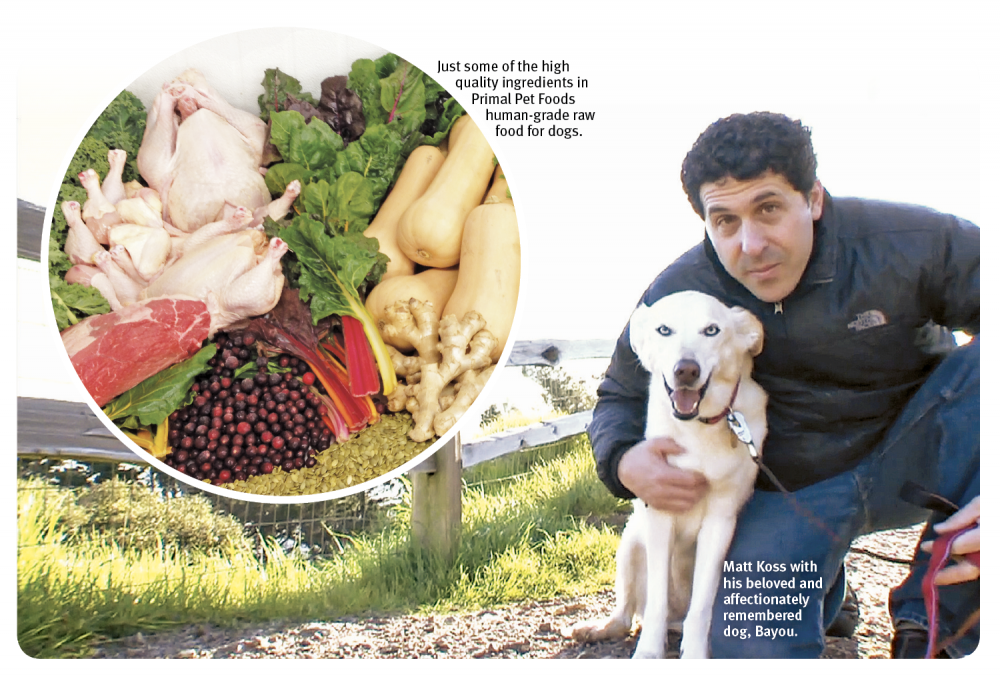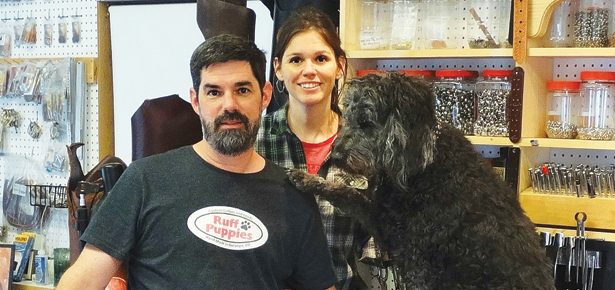
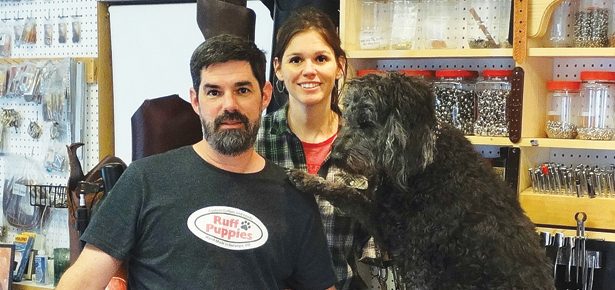
These Entrepreneurs Turned Their Love of Dogs Into Careers They Adore
Stuck in a job you don't like? Get inspired to make a change!
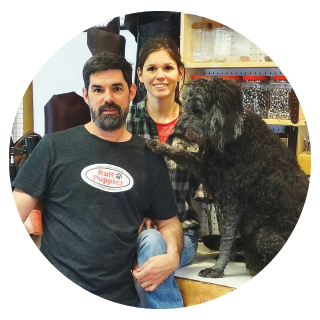
Ruff Puppies collars exhibit a very of-the-moment, handcrafted aesthetic that speaks to the co-founders’ passion and commitment to their craft, responsible business practices, and community.
Chatting with Bryan Hargett, co-founder of Ruff Puppies collar company, it’s easy to see why this small company’s custom collars and leads are infused with the handcrafted ethos of their maker, and why his particular speciality is gorgeous western styles. After all, this small company is located in south-western Colorado near the Animas River Valley, surrounded by the San Juan Mountains. The stark beauty of the place seems to flow through co-owner Bryan's hands and into the collars and leashes Bryan makes with such care.
Bryan, along with his wife, Jess, are the two-person team behind Ruff Puppies. They started slow and small, with talent and craftsmanship leading them to start their own business. First came the workspace: Bryan built a small, 400-square-foot shop on their rural property about 15 miles from Durango, Colorado, near the New Mexico border. Nestled at the foot of a small
shrub-covered hill, surrounded by sagebrush, the shop has plenty of natural light. Nearby sandstone cliffs rose up to the sky, and the Florida river (pronounced Flor-read-a), flows through their property. Inspiration followed.
One of Bryan’s first projects in his new workshop was a collar for Jess’ dog, Molly. “Molly was my wife’s soulmate so I knew I had to make the collar super special,” he explains. Bryan chose black leather with fuchsia-colored Swarovski crystals. Molly seemed to sparkle when she wore it. Friends and neighbours really liked it and Bryan was soon fashioning more one-of-a-kind collars and leashes. Sarah Guinther, the buyer for Pet Haus, the local pet store in Durango, took note and asked for a selection. Pet stores in nearby areas followed suit and Ruff Puppies’ products are now widely available throughout the U.S.
Bryan is quick to acknowledge that Jess played a large role in Ruff Puppies’ expansion. While he fashions the leather, Jess handles the day-to-day aspects of building the business, building relationships with customers through phenomenal customer serivce and helping design the collars. Together, the two handle every aspect of every product that leaves their shop.
The process begins with the leather, which they buy from Wickett & Craig, one of the few companies in the U.S. that still tan leather. Unlike other companies that use chemicals such as chromium, Wickett & Craig uses earth-friendly vegetable dyes from oak tannins. The company even has its own water treatment system, though doing this adds extra expense. Finally, the company follows American regulations, which Bryan says is much better for the planet than the practices of unregulated companies.
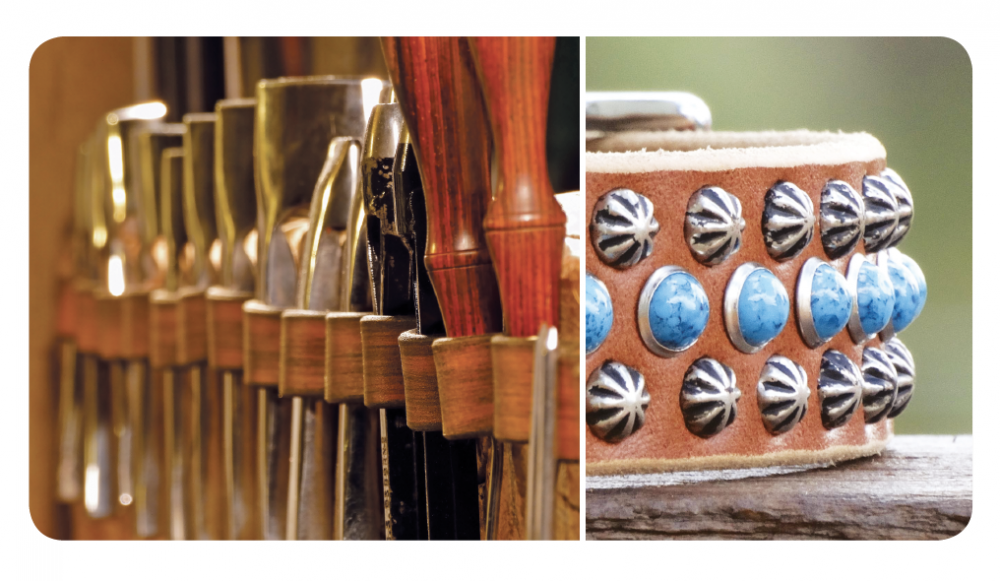
Bryan is staunch in his adherence to old-world practices. “I don’t use glue on my products—I don’t want to expose myself, my customers, or the environment to the glue. And we don’t glue layers together. They would just fall apart and we are building our collars to last. I give a lifetime guarantee on my products and what I mean by that is my lifetime. If something goes wrong with a collar, and I’m alive, I’ll fix it.”
Ruff Puppies buys its materials from local sources in the States wherever possible, and have named some of their collections after western cities such as San Antonio and Denver. “Cities have a personality, a flavour,” Hargett notes.
However, the business is about more than the beauty of the Western landscape or the durability of its products. Says Bryan:
“What we wish we could show everyone is the day-to-day decisions we make that take the focus off profits and put it on things like responsible purchasing, fellow small businesses, and our community—all the those things you can't see when you hold a product… you know, the really important things.”
The Food Maker
Working from the gut, entrepreneur Matt Koss’ journey to save his dog Luna led him to start his own pet food company, one predicated on raw, human-grade foods for dogs, promoting health and vitality
"Question what people are telling you,” pet food maker Matt Koss asserts. “If your gut tells you something is not right, keep going until you find the information you need.”
That is exactly what Matt did when veterinarians kept giving his dog, Luna, who had early signs of renal failure, a bleak prognosis. Since the kidney regulates blood pressure and produces red blood cells, it was a serious concern. The vets kept telling Matt there was not much they could do to reverse or cure the disease, but Matt’s gut told him a different story. He thought there must be some way he could help Luna and, tenacious by nature, he sought an approach to put into action. His quest eventually led him to create his own company, Primal Pet Foods, maker of organic, high quality, human-grade raw food for dogs and cats.
Matt’s journey started when a holistic veterinarian introduced him to the work of Dr. Ian Billinghurst, an Australian veterinarian who believed commercial, supermarket-style pet food was making companion animals sick. Instead of the kibble and corn found on supermarket shelves, Billinghurst recommended a diet comprised of the specific foods that these species ate as they evolved over millions of years. Since dogs in the wild are both hunters and scavengers, the Aussie vet recommended a regimen containing a wide range of both animal protein and whole plant foods. He called this a “Biologically Appropriate Raw Food” diet or BARF, for short.
A chef by trade, schooled in human nutrition, Matt decided to experiment with Luna’s diet. He tossed the kibble and got to work creating a delicious diet of human-grade raw meat and bones as well as a variety of high quality, whole plant foods. Then he watched and waited, wondering if such a radical change in diet could bring about an equally radical change in health. As she gobbled down the highly nutritious, custom-made meals created with great love and attention, Luna’s health took a turn for the better. Matt saw an increase in energy, an increase in appetite, and an overall sense of improved wellness. This time Matt’s gut told him he was on the right track.
Matt continued to refine his recipes, striving to create a wholesome diet that would help pets not just survive, but thrive. As he improved his formulations and expanded his offerings,
Matt found his workspace—his kitchen—was getting a bit small. He bought some new equipment and moved to a larger space: his garage.
At the time, Matt was still working his day job as a chef for a family in the San Francisco Bay area. At night, however, he would stay up until the early hours, formulating nutritious canine
meals. Matt talked to a retailer around the corner, asking him, “If I make it, would you sell it?” The retailer said yes, and Matt’s wholesome raw food diet took off from there.
Matt continued to work hard, expanding his menu of meals for dogs. However, the working day and night routine got to be a bit too much. “There comes a point when you have to make a leap,” he explains. Despite the uncertainties of launching a new raw food diet for dogs and cats, Matt took the leap, though readily admits, “It was a scary point in time, a day that I still remember.”
His customers started telling him about how good his food made their pets feel, noting improvements in their dogs’ and cats’ coats and teeth, along with brighter eyes and even positive changes in personality. They reported their pets seemed happier, attributing it to their improved diet.
“Hearing about what our foods were doing for their pets was fuel for me,” explains Matt. “It kept pumping my engine, and I didn’t look back.”
Today, Primal has a full product line of complete meals and supplemental treats for both dogs and cats. The poultry, beef, and game in the company’s meals are 100 percent human-grade as well as antibiotic and steroid free. Primal sources its ingredients from producers in the U.S. and New Zealand and creates its meals in facilities certified by the U.S. Department of Agriculture. Harking back to the days when the ancestors of domestic dogs hunted and foraged in the wild, the products contain fruits and vegetables but no processed grains such as wheat and rice. Primal’s extensive line includes specific canine and feline formulations available in raw frozen and freeze-dried formulas as well as treats containing no preservatives, grains or gluten. The products are available in independent pet retail stores across the U.S. and Canada rather than in big box stores because these smaller distributors educate consumers about the benefits of feeding high-quality, nutritious food.
For those who are new to the concept of feeding their pets using the BARF approach, Primal’s website includes extensive information about the benefits of an organic, raw foods diet as well as the wide-ranging measures the company has taken to assure its products are safe for pets to consume. “Most animals go berserk over feeding raw,” affirms Matt. “When they hear the fridge open, they do twists and turns, and you can see how happy they are.”
Matt has come a long way since he first cooked up a meaty, wholesome meal for Luna. Now hundreds of thousands of pets like Luna are eating Primal foods and Matt’s dream has come to fruition. While the operation has grown, the core values and mission has remained exactly the same: simply to produce delicious and nutritious, biologically appropriate meals for our animal companions so they can remain healthy and happy.
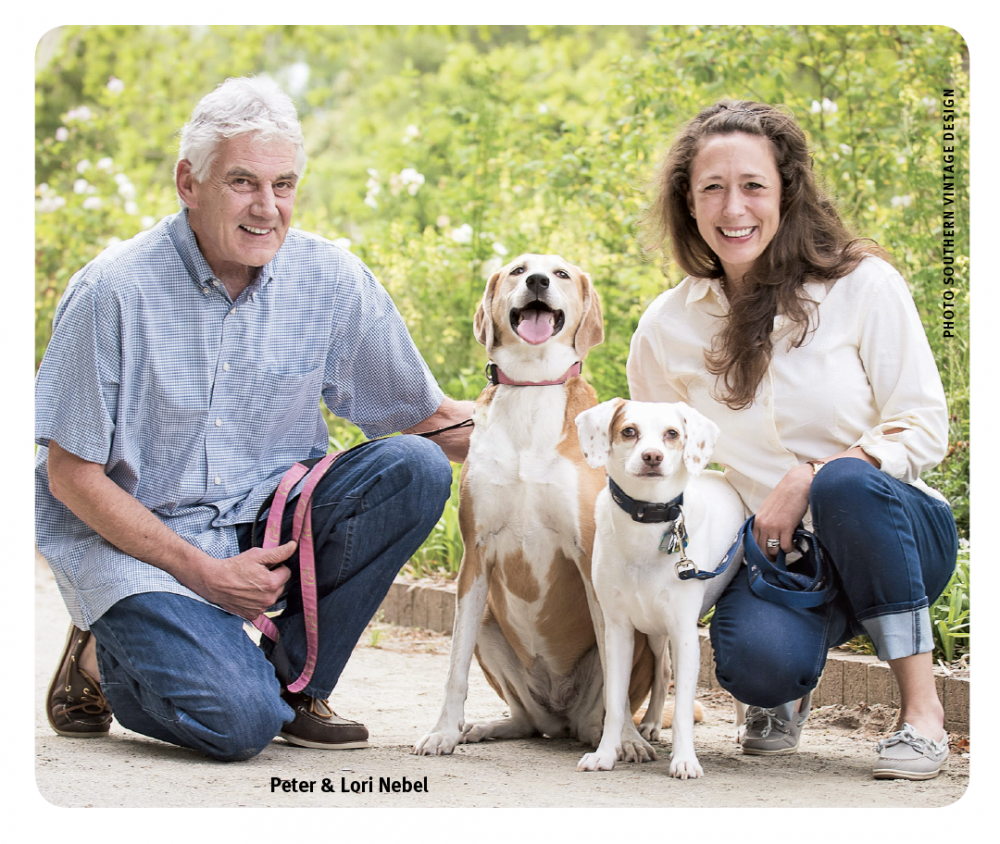
When husband and wife Peter and Lori Nebel both found themselves jobless, victims of the recession, they took their savings and started a new chapter, reinventing themselves as first-time entrepreneurs and proud owners of a pet store franchise
It was 2008. The housing bubble in the United States had burst, causing housing prices to fall drastically. Government-sponsored enterprises such as Fannie Mae and Freddie Mac, which had invested heavily in subprime mortgages, started to report record-breaking losses. In a plummeting financial market, U.S. corporations made drastic cuts to the workforce in an attempt to stay solvent.
At the Fortune 500 Company where husband and wife Peter and Lori Nebel worked, the first wave of layoffs rolled through and Peter found himself out of a job. “It was heartbreaking to see the layoffs happen,” explains Lori. “There were a lot of good people who were let go.” Then the second wave rolled through and Lori was out of a job too. Peter and Lori found themselves in the same unfortunate situation as hundreds of thousands of other responsible, hardworking Americans: out of work with little chance of finding employment in a bleak job market.
It was at this low point when Peter, searching the Internet for business opportunities, came across a pet retail chain called Pet Supplies Plus, which offered franchise opportunities. It seemed like a good match for the Nebels, who were lifelong animal lovers and had two rescue dogs, Roady and Sawyer.
Peter contacted Pet Supplies Plus to get more in-depth financial information about the company and liked what he saw. “We did our research and the company looked solid to us,” explains Lori. Pet Supplies Plus had extensive financial information on its website including the initial franchise fee (which varies depending on location), royalty fees, and average annual earnings. Equally appealing was that prospective operators did not need retail experience because the company provides training on all aspects of running a store, from ordering stock to training employees.
The Nebels also learned the company offers franchisees a “protected territory” to ensure there is only one Pet Supplies Plus store in a given trade area. Moreover, the pet industry in the United States has remained profitable despite the recession. When the company suggested an opening in South Carolina, the couple flew from their home in Boston, Massachusetts to the Charleston area to take a closer look.
Pet Supplies Plus provided the Nebels with detailed information about the local population, detailing age, average income, and the number of pets per household. They also suggested a possible location in the town of Summerville, about a half hour drive from Charleston. ““It was perfect because we were miles away from other large competitors,” explains Lori, noting that the proposed spot also “had a steady flow of traffic from some nearby high-end grocery stores.” The Nebels decided to go ahead and sign a lease with Pet Supplies Plus for the proposed location.
Like all stores in the franchise, the Nebel’s store is built on the supermarket model, with wide aisles, a handy parking lot, and convenient hours. They also offer a full range of services, including a self-service pet wash, full service grooming, and preventative veterinary services such as microchipping, low cost vaccines, and heartworm testing.
Operating the store has also given the Nebels a greater platform to pursue their passion for animal welfare. They hold regular adoption events at the store and support local rescue initiatives. Lori also helps individual animals in need such as Iris, a hound who was picked up by animal control staff and brought to a local shelter. “She was emaciated, heartworm positive, and a hound (of which there are an overabundance in Southern shelters), so she had three strikes against her,” explains Lori. “The shelter was overcrowded and she was placed on the PTS (“Put to Sleep”) list so Lori decided to foster Iris at the store. For near nine months she lived at Pet Supplies Plus recovering her health and becoming accustomed to other people and animals, before Lori found her a home of her own: “an awesome family with two kids and another dog.”
There are definite perks to being your own boss. For one, you can think outside the box. The Nebels embraced an unusual business venture when they allowed an eight-year-old girl, Rachel Mennet, to operate a lemonade stand in their store. The enterprising young girl had heard about Nick Bailey, a veteran who served two tours in Iraq, and wanted to help. A mortar had struck Bailey on his last tour and he suffered from mobility issues and Post Traumatic Stress Disorder. He wanted to have Abel, his German Shepherd dog, trained as a service animal but found the cost prohibitive. One glass of lemonade at a time, Mennet raised over $6,000 for the grateful veteran.
Although she describes her business as being “24/7,” Lori remains passionate about her work. She says pet lovers who dream of owning their own pet store should look at the opportunity not as an investment but as a livelihood. “Live it, work it, believe in it,” she emphasizes.
Join the newsletter and never miss out on dog content again!
"*" indicates required fields
By clicking the arrow, you agree to our web Terms of Use and Privacy & Cookie Policy. Easy unsubscribe links are provided in every email.
